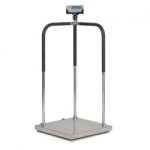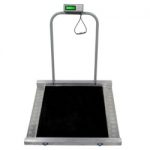There are several different types of medical scales that are used at hospitals on a daily basis, and each of them serves a specific purpose. Some of the most common types of scales used in hospitals include: bed scales, chair scales, handrail scales, physician scales, wheelchair scales, and baby scales.
Choices for Weighing Patients in a Hospital
Bed scales are designed to be used with patients who are confined to a bed. These scales are typically equipped with four small platforms that can be placed under the patient’s bed, allowing them to be weighed without having to be transferred to a standing scale. Bed scales are typically used to monitor the weight of patients who are bedridden or who have mobility issues, as well as to track changes in weight over time.

Chair scales are kind of similar to bed scales, but they are designed to be used with patients who are able to sit upright in a chair. These scales are typically equipped with a load cell that is placed under the chair scale seat, allowing the patient to be weighed while sitting down. Chair scales are often used with elderly or disabled patients, or with patients who are unable to stand for extended periods of time.
Physician scales are designed to be used with patients who are able to stand and step on to the scale. These scales are typically equipped with a platform and a column that is at a standing height, allowing patients to be weighed while standing up. Physician scales are often used in hospitals and clinics to weigh patients as part of routine check-ups or to monitor changes in weight over time. The weight display is often at eye level for easy reading. Often these scales include a mechanical height rod as well.
Handrail scales are similar to physician scales, except they also have a handrail built in. These hand rail scales are great for regular everyday patients and for those folks who need a little assistance when stepping on a weighing scale.
Some scales can handle multiple uses. For example, there are some wheelchair scales that have a built in handrail and/or a built in chair. So one scale could technically be a chair scale, wheelchair scale, and handrail scale… in one item.

Wheelchair scales are utilized for weighing patients who are confined to a wheelchair. These wheel chair scales typically have a generous platform size with at least one ramp. The patient rolls on to the scale platform while sitting in their wheelchair and is then weighed.
Tare Weight Info
If the hospital knows the weight of the wheelchair itself, they can “tare” off that weight in order to get a true weight of the patient. If the hospital doesn’t know the weight of the wheel chair, then it’s likely that the patient will need to be helped out of the wheelchair, so that the chair itself can get weighed so that everyone knows how much the wheelchair by itself weighs. Then, that weight can be “tared” off the scale. We’ve actually discussed recommended wheelchair scales in past entries.
Baby scales are designed specifically for weighing newborns and infants. These infant scales are typically equipped with a platform that is small and lightweight, making it easy to weigh even the smallest babies and since the scales are light weight, they are usually quite portable for taking to various locations. Popular baby scales are often used in hospitals, clinics, and pediatric offices to track the growth and development of newborns and infants. There are also baby scales that include a seat built in. Those are not considered portable.
There are several reasons why it is important to use accurate scales at a hospital versus the lowest cost scales available. First, accurate scales are essential for monitoring the health and well-being of patients. By accurately measuring and tracking a patient’s weight, healthcare providers can identify and address any changes or abnormalities that may be indicative of underlying health issues. For example, significant changes in weight can be a sign of underlying health problems such as malnutrition, fluid imbalances, or something more serious. By accurately measuring and tracking weight, healthcare providers can identify and address these issues before they become more serious.
In addition to monitoring the health and well-being of patients, accurate scales are also important for ensuring the safety of patients. Accurate measurement of a patient’s weight is essential for determining the correct dosage of medications and other treatments. If a patient’s weight is not accurately measured, they may be given too much or too little of a particular medication or treatment, which can have serious consequences. By using accurate scales, healthcare providers can ensure that patients are receiving the correct dosage of medications and treatments, helping to protect their overall safety.
Accurate scales and weighing equipment are important for ensuring the efficiency and effectiveness of healthcare operations. By accurately measuring and tracking the weight of patients, healthcare providers can optimize the use of resources and improve the efficiency of their operations. In addition, accurate measurement of weight can help to improve the accuracy of clinical decision-making, leading to better patient outcomes.
So, getting back to the question: What type of Accurate Scales are used at a Hospital?
There are several different types of scales that are used at hospitals, including bed scales, chair scales, physician scales, handrail scales, wheelchair scales, and baby scales. It is important to use these accurate scales at a hospital for a variety of reasons, including monitoring the health and well-being of patients, ensuring the safety of patients, and improving the efficiency and effectiveness of healthcare operations. In addition to using the scales, it’s also important to have the scales checked periodically and calibrated if needed by a reputable scale company nearby.
By prioritizing the purchase of QUALITY & ACCURATE scales, hospitals can provide better overall care and hopefully contribute in a small way to better outcomes for their patients.